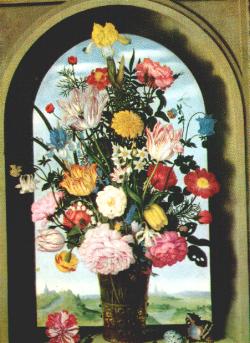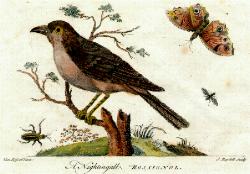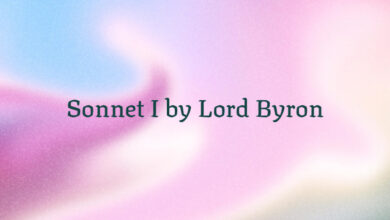
William Shakespeare – Sonnet 98
From you have I been absent in the spring,
When proud pied April, dressed in all his trim,
Hath put a spirit of youth in every thing,
That heavy Saturn laughed and leapt with him.
Yet nor the lays of birds, nor the sweet smell
Of different flowers in odour and in hue,
Could make me any summer’s story tell,
Or from their proud lap pluck them where they grew:
Nor did I wonder at the lily’s white,
Nor praise the deep vermilion in the rose;
They were but sweet, but figures of delight,
Drawn after you, you pattern of all those.
Yet seemed it winter still, and you away,
As with your shadow I with these did play.
The poet’s lament over his separation from the beloved continues. Everything else is enjoying springtime and rebirth, but he alone is locked in hideous winter. All the occurrences of Spring remind him of the youth, for the beauties of the seasons are based on the youth’s beauty and derive from him. Therefore the poet only toys absent-mindedly with these manifestations of beauty, for he desires the real thing, the pattern of all beauty, and that is, in Platonic ideology, the beloved youth who is the form that inspires and creates everything that lives and grows.
SB (p.319) suggests a link between lines 1-5 and Chaucer’s introduction to The Canterbury Tales, lines 1-11, which I give below.
Whan that Aprille with his shoures sote
The droghte of March hath perced to the rote,
And bathed every veyne in swich licour,
Of which vertu engendred is the flour;
Whan Zephirus eke with his swete breeth
Inspired hath in every holt and heeth
The tendre croppes, and the yonge sonne
Hath in the Ram his halfe cours y-ronne,
And smale fowles maken melodye,
That slepen all the night with open eye
(So priketh hem nature in hir corages)
shoures sote = sweet showers; droghte = drought; perced = pierced; swich licour = such liquid; vertu = life giving force; flour = flower; Zephirus = the West wind; eke = also; inspired hath = has breathed into; holt = woodland; yonge sonne = young sun; Hath in the Ram etc. = has travelled half way through the zodiacal sign of the Ram (Aries) fowles = birds; So priketh hem nature = For nature stimulates them (to sing); in hir corages = in their hearts.
The 1609 Quarto Version
FRom you haue I beene abſent in the ſpring,
When proud pide Aprill (dreſt in all his trim)
Hath put a ſpirit of youth in euery thing:
That heauie Saturne laught and leapt with him.
Yet nor the laies of birds,nor the ſweet ſmell
Of different flowers in odor and in hew,
Could make me any ſummers ſtory tell:
Or from their proud lap pluck them where they grew:
Nor did I wonder at the Lillies white,
Nor praiſe the deepe vermillion in the Roſe,
They weare but ſweet,but figures of delight:
Drawne after you, you patterne of all thoſe.
Yet ſeem’d it Winter ſtill,and you away,
As with your ſhaddow I with theſe did play.
Commentary
1. From you have I been absent in the spring,The description of the pain of absence continues, but here the season described is spring rather than the summer of the previous sonnet. However spring turns into summer in line 7, and the joyousness of the season of growth and burgeoning flowers is what is intended.2. When proud pied April, dressed in all his trim,proud pied = resplendently variegated. Pride and the adjective proud are often used in descriptions of rich clothing. As in
Thy youth’s proud livery, so gazed on now, 2.
and elsewhere in the Sonnets (52, 64, 91, 104). Many editions give proud-pied but the hyphen is not in Q and does not appear to be necessary. The word pied, meaning dappled, variegated,is rarely used nowadays, except in compound names (see below). There are three other occurrences of it in Shakespeare, the following being the most famous and apposite:
When daisies pied and violets blue
And lady-smocks all silver-white
And cuckoo-buds of yellow hue
Do paint the meadows with delight, LLL.V.2.904-7.
Some glossaries give the meaning as ‘motley-coated, wearing the motley coat of a jester’ but it is uncertain what the coat of a jester in Shakespeare’s day looked like. Pied is still found in many bird and animal names, as pied wagtail, pied fly-catcher, pied-wolf, where it means streaked or iridescent or variegated. The magpie was in former times known simply as the ‘pie’.3. Hath put a spirit of youth in every thing,a spirit of youth = the essence of youth, youthful vigour. Compare:
O spirit of love! how quick and fresh art thou,
That, notwithstanding thy capacity
Receiveth as the sea, nought enters there,
Of what validity and pitch soe’er,
But falls into abatement and low price,
Even in a minute TN.I.1.9-14.
There is possibly a bawdy innuendo in spirit. See Sonnet 129 line 1.4. That heavy Saturn laughed and leapt with him.heavy Saturn = the gloomy God of dearth and winter. In astrology the planet Saturn was the tutelary deity of the melancholy humour, and governed those of a gloomy, sour and heavy temperament. He was also associated with old age.5. Yet nor the lays of birds, nor the sweet smellthe lays of birds = bird song. a lay is ‘a short lyric or narrative poem intended to be sung’. (OED.n.4.1.). It has been applied poetically to bird song since at least the 14th cent.6. Of different flowers in odour and in hue,different – the word seems to apply to ‘sweet smell’, ‘flowers’ and ‘in odour and in hue’. hue = colour, appearance. See Sonn 20.7. Could make me any summer’s story tell,summer’s story = happy account or tale. A winter’s tale by a fireside was proverbial, but the summer’s story seems to have been Shakespeare’s invention. Summer and winter, April and December, warmth and freezings, happiness and sorrow are continually thrown into contrast in these two sonnets. Inevitably this finds echoes in other of Shakespeares works, such as The Passionate Pilgrim:
Crabbed age and youth cannot live together:
Youth is full of pleasaunce, age is full of care,
Youth like summer morn, age like winter weather;
Youth like summer brave, age like winter bare PP.12.
Rosalind in As You Like It wittily contrasts the state of mind of the sexes before and after marriage. She also chooses April and December as being the two months most typical of sweetness and harshness:
No, no, Orlando; men are April when they woo, December when they wed: maids are May when they are maids, but the sky changes when they are wives. AYL.IV.1.8. Or from their proud lap pluck them where they grew:their proud lap – the lap of the earth, in which the flowers grow. i.e. ‘I was not sufficiently moved by the songs of birds or the beauty of the flowers of spring to feel inspired to pick a bunch of them’.9. Nor did I wonder at the lily’s white,white – this could be adjectival, as in ‘white lilies’; or it could be a substantive, as in ‘the whiteness of the lily or lilies’.10. Nor praise the deep vermilion in the rose;deep vermillion = a deep, rich crimson colour.11. They were but sweet, but figures of delight,
but = only, merely.
sweet = sweet, pleasant objects; the epitome of sweetness.
figures of delight = delightful patterns or preliminary sketches, or full scale drawings. Shakespeare’s use of figure and its compounds in the Sonnets is probably relevant here.
If ten of thine ten times refigured thee: 6
Ah! yet doth beauty, like a dial-hand,
Steal from his figure and no pace perceived; 104
So all their praises are but prophecies
Of this our time, all you prefiguring; 106
What’s in the brain that ink may character
Which hath not figured to thee my true spirit? 108
Sonnet 104 is the only other one to use figure as a noun, where it means either ‘number on the clock face’, or, because of the context, ‘your (the beloved’s) appearance’. Here, however, the subsequent line seems to confirm that a drawing, or outline, or sketch, or full picture is intended. It is also apparent that the Neo-Platonic concepts of the ideal form and its copy are being referred to. The individual roses and lilies are only copies of an ideal original, they are figures drawn from an original pattern which is perfect in every respect. In this case the beloved is the pattern from which the figures (copies) are drawn.
figures of delight seems to echo the line in the song from Love’s Labours Lost already quoted in the note to line 2 above:
Do paint the meadows with delight,
The entire sonnet is imbued with the contrast between winter and spring or summer.12. Drawn after you, you pattern of all those.drawn after you = copied, taking you as the model. For the thought see the note above. Sonnet 53 outlines the philosophical concepts, derived from Plato, that are used again here:
What is your substance, whereof are you made,
That millions of strange shadows on you tend?
Since every one hath, every one, one shade,
And you, but one, can every shadow lend. 53
substance abovecorresponds to pattern in this sonnet and shadow to figure.13. Yet seemed it winter still, and you away,Yet seemed it winter still = Yet it appeared that it was still the winter season. still however could be adjectival, the meaning being ‘silent, unmoving, barren winter’.
you away = you being absent.14. As with your shadow I with these did play.shadow – see note to lines 11-12.
to play with has sexual overtones, as also do the words proud, spirit, leapt, pluck. But the crowding in of other images more or less makes such hints inactive.





